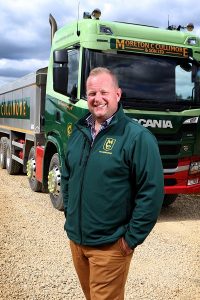Cullimore: keeping the wheels turning during Covid-19
 Moreton F Cullimore, managing director of Gloucestershire haulier The Cullimore Group, offers an insight into how the firm has kept its fleet operating through uncertain times
Moreton F Cullimore, managing director of Gloucestershire haulier The Cullimore Group, offers an insight into how the firm has kept its fleet operating through uncertain times
The Cullimore Group history dates back more than 90 years. In that time, we have provided vehicles to support the construction of airfields during World War II, and became one of the early pioneers of using motor transport for delivering milk and livestock to the local markets in the dark days of the 1920s depression. And most recently, during a year that none of us could ever had predicted, our vehicles have traversed the counties of Gloucestershire and Wiltshire, keeping the local communities connected and well-stocked.
It has been arguably one of the most monumental challenges my company has faced. I remember my first visit to the office a couple of days after the first lockdown was announced and how surreal it was to see 95 per cent of the fleet parked up. It was like being there on a Sunday morning.
But, together, we have been able to keep on the road. At the height of the first lockdown, two of our drivers worked flat out to deliver flour and bread directly from a mill in Gloucestershire, as well as other journeys often in convoy, to make sure our local community shops could keep products on the shelves. At the same time, we still had orders for aggregates and concrete for use at water works and in construction projects which had not been put on hold.
As time has progressed, we’ve slowly been able to get back to something resembling normality. The first phased return in the spring saw us reopen our quarry sites following renewed orders for concrete and other construction materials, along with the MOT testing lane at our head office just off Junction 13 of the M5.
When the second lockdown in England was announced, the entire Cullimore Group (Cullimore Mix, Moreton C Cullimore Gravels, and Moreton C Cullimore & Son) remained open for orders for essential materials, adhering to the social distancing guidelines we have followed throughout the pandemic.
Like businesses in almost every sector, the financial implications of Covid-19 have been strongly felt across haulage. Our sector has also had the added burden of tariffs and taxes which have continued to be a weight on our shoulders – even with the vast majority of fleets being parked.
Though we own our vehicles outright, there are still the standing costs to contend with; without customer orders due to projects being suspended, the repairs and general maintenance outgoings soon mount up.
 Then, of course, came the reintroduction of the congestion charges in May and a subsequent increase in June. Though the support hauliers have received is welcome, in some areas, it wasn’t necessarily wide-ranging and still meant that gaps had to be filled.
Then, of course, came the reintroduction of the congestion charges in May and a subsequent increase in June. Though the support hauliers have received is welcome, in some areas, it wasn’t necessarily wide-ranging and still meant that gaps had to be filled.
The Cullimore Group has been fortunate in that significant projects have still required materials delivered by our vehicles. But I know that many of my peers have not been so lucky. It was by acting quickly at the start of the pandemic and remaining in constant communication with our customers that we have kept on going.
Slowly but surely, more of our vehicles are getting back on the roads, but the fact remains that our sector has a turbulent period ahead with Brexit and the full impact of Covid-19 still yet to be realised.
If there is a silver lining to come out of the pandemic, it is that haulage is finally starting to get the recognition it deserves. A petition for better driver facilities at major infrastructure projects has received nearly 12,000 signatures, and my local MP has brought the sector’s vital contribution to the attention of the government.
As we start to understand what the new world will look like, small independent companies from all industries, not just haulage, must have the protection and the support to continue as the backbone of the UK economy. Just like a family, we all need to look out for one another, not just ourselves.











